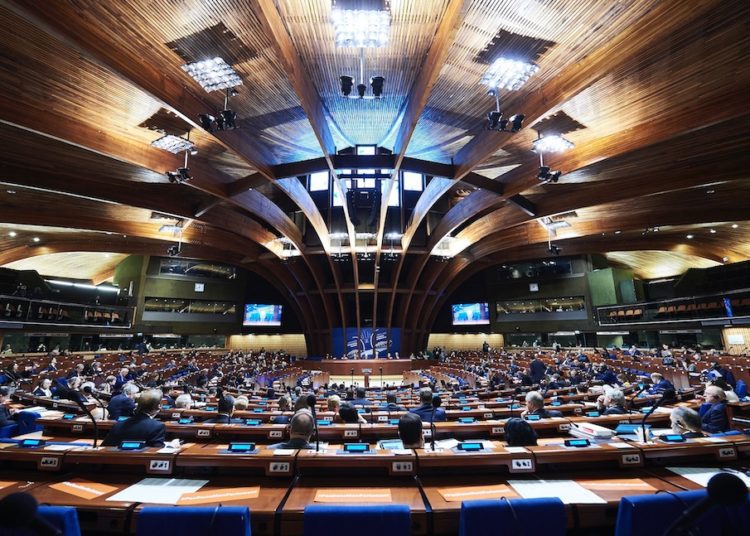Nordic Monitor
The Parliamentary Assembly of the Council of Europe (PACE) has slammed Greece and Bulgaria for the forcible expulsion of refugees and asylum seekers, often described as pushbacks, to Turkey in a report that will be debated in Strasbourg on Friday.
The report, drafted by Tineke Strik of the Netherlands, criticized the growing phenomenon of pushback policies and practice in clear violation of the rights of asylum seekers and refugees, including the right to seek asylum and protection against refoulement, which it stated lies at the core of international refugee and human rights law.
Pushbacks and other violent actions appear to remain widespread along the border of Bulgaria with Turkey, according to the PACE report. Turkish agencies and organizations report that at least 10,000 individuals are being pushed back collectively from Bulgaria and Greece into Turkey on a monthly basis, it noted.
Low numbers of new arrivals in Bulgaria in the first half of 2018 and a sharp increase in the second half indicate unofficial cross-border cooperation between the Bulgarian and Turkish governments to prevent access through this external EU border, at least for the duration of the Bulgarian presidency of the EU Council.
Since mid-2017 there have been frequent reports of pushbacks into Turkey by Greek authorities at the Evros border, the report stated, accusing the Greek authorities of summarily expelling migrants at this border, where migrants were allegedly beaten, robbed of their possessions and subjected to ill treatment by “forces wearing uniforms and masks without recognizable insignia” according to Human Rights Watch findings as well as reports by media outlets.
In April 2019 a group of Turkish asylum seekers claimed that following an attempt to cross the Evros River into northeastern Greece they were pushed back to the Turkish side after being beaten by masked men with batons. Tuğba Özkan, a journalist in the group, claimed that 15 people fleeing persecution in Turkey crossed the Turkish-Greek border at 9 p.m. near the town of Soufli on April 26, 2019.

When they set foot on Greek soil, however, she said a group of masked men beat them and pushed them back across the river to the Turkish side, where a post-coup crackdown targeting the Gülen movement followers has led to the prosecution of over half a million people.
A family of four from the group reportedly was apprehended by Turkish security forces, and the parents were detained. The remaining 11 people, including Özkan, attempted to cross the border for a second time. The group managed to cross the Evros safely in their second attempt, she said, and the group was hiding from a possible attack when two Greek police cars found them.
Greek police detained the group at around 2 p.m. on April 27 near the border and took them into custody, according to the Greek Council for Refugees (GCR), a nongovernmental organization defending human rights and fighting against illegal pushbacks in the region.
The group applied for asylum in Greece and was released a few days after the official registration was completed, according to GCR lawyers.
In February 2018 the GCR reported that “large families, pregnant women, victims of torture but also minors” were victims of pushbacks at the Evros border. According to the GCR: “A common element in their testimonies is their arbitrary detention in police stations, under extremely poor hygiene conditions, the use of violence and their subsequent transfer, crammed in vans, on one side of the river, wherefrom, on overcrowded boats, they are transferred to the other side, with their lives exposed in danger and in violation of fundamental human rights.”
The practice continued throughout 2018 according to GCR and Greek NGOs ARSIS and Human Rights 360.
In April 2018 the Council of Europe’s Committee on the Prevention of Torture and Inhuman, or Degrading Treatment (CPT) reported the following after a visit to Greece regarding police and border guard stations in the Evros region: “Several foreign nationals interviewed in private at three places of detention made credible allegations about the occurrence of push-back operations from Greece to Turkey by boat across the Evros River border, after they had been apprehended by Greek police and border guards.

“A number of them alleged that they had been physically ill-treated (including baton blows to the head) by police and border guard officers or (para-)military commandos during such push-back operations. … the CPT considers that, at least until early March 2018, these persons were not effectively protected against the risk of refoulement. The Committee recommended that the Greek authorities act to prevent any form of push-backs taking place, and effectively protect foreign nationals against the risk of refoulement.”
The PACE report urged the member states to protect asylum seekers, refugees and migrants arriving at the borders of Europe and to refrain from any pushbacks, to allow for independent monitoring and to fully investigate all allegations of pushbacks. It called on member states to comply with their international obligations in this regard, in particular those set out in the European Convention on Human Rights concerning the prohibition of collective expulsion and inhuman and degrading treatment as well as the right of access to asylum procedures and the prohibition of refoulement as established in the United Nations Refugee Convention.
Other members states such as Spain, Poland, Croatia, Serbia and Italy were also listed among member states where pushback instances were recorded.
The report underlined that there are persistent reports and evidence of inhuman and degrading treatment by member states and their agencies in the framework of those pushbacks through intimidation, taking or destroying migrants’ belongings and even through the use of violence and depriving migrants of food and basic services. The report describes reported cases of pushbacks and makes recommendations devised to stop them.
The full draft report is posted below:












